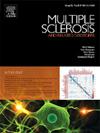A retrospective evaluation of patient characteristics and recommendations of a novel multidisciplinary clinic for persons with advanced disability from multiple sclerosis
IF 2.9
3区 医学
Q2 CLINICAL NEUROLOGY
引用次数: 0
Abstract
Context
Persons with advanced multiple sclerosis (MS) require care beyond the disease modifying treatments offered in conventional MS clinics to address their complex physical and psychosocial needs. In the novel MS Comprehensive and Palliative Care (MSCPC) Program, an MS neurologist, palliative care specialist, and physiatrist collaborate to identify these needs and improve symptom control.
Objectives
To characterize the medical, physical, and psychosocial concerns of persons with advanced disability from MS and describe the recommended interventions of the MSCPC Program.
Methods
Retrospective chart review of consecutive patients seen in the MSCPC Program from 2019 to 2022.
Results
54 patients were assessed over 74 clinic appointments. Patients’ mean age was 59.4 ± 10.8 years (range 37–81) and mean duration of MS was 24.8 ± 11.8 years (range 2–52); 79.7% of patients had secondary progressive MS with median and mode disease severity (EDSS) of 7.5 and 8.5, respectively (range 4–9.5). 70.3% lived at home with a caregiver; the primary caregiver was the spouse for 51.4% of cases. 85.1% of patients received publicly funded in-home assistance for activities of daily living. The most prevalent sequelae of MS were incontinence (89.9%), spasticity (82.6%), and pain (78.3%). ≥1 symptom was addressed at 95.7% of appointments, most often pain (63.8%), spasticity (60.9%), and bowel (59.4%); medication deprescribing was recommended at 29.0% of appointments. Caregiver burnout was identified at 56.5% of appointments.
Conclusion
This novel program identified high prevalence of symptoms and made recommendations to improve symptom control at >95% of appointments, suggesting unmet symptom control needs in persons with advanced disability from MS.

求助全文
约1分钟内获得全文
求助全文
来源期刊

Multiple sclerosis and related disorders
CLINICAL NEUROLOGY-
CiteScore
5.80
自引率
20.00%
发文量
814
审稿时长
66 days
期刊介绍:
Multiple Sclerosis is an area of ever expanding research and escalating publications. Multiple Sclerosis and Related Disorders is a wide ranging international journal supported by key researchers from all neuroscience domains that focus on MS and associated disease of the central nervous system. The primary aim of this new journal is the rapid publication of high quality original research in the field. Important secondary aims will be timely updates and editorials on important scientific and clinical care advances, controversies in the field, and invited opinion articles from current thought leaders on topical issues. One section of the journal will focus on teaching, written to enhance the practice of community and academic neurologists involved in the care of MS patients. Summaries of key articles written for a lay audience will be provided as an on-line resource.
A team of four chief editors is supported by leading section editors who will commission and appraise original and review articles concerning: clinical neurology, neuroimaging, neuropathology, neuroepidemiology, therapeutics, genetics / transcriptomics, experimental models, neuroimmunology, biomarkers, neuropsychology, neurorehabilitation, measurement scales, teaching, neuroethics and lay communication.
 求助内容:
求助内容: 应助结果提醒方式:
应助结果提醒方式:


